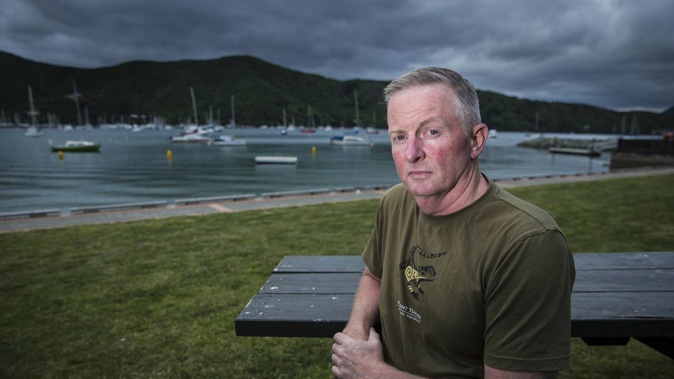

WARNING: This story deals with suicide and may be upsetting.
The death of Guy Wallace, the water taxi driver who was one of the last people to see Ben Smart and Olivia Hope alive and a key witness in the murder trial of Scott Watson, was self-inflicted says a coroner.
Wallace was 55, living alone in Greymouth, and about to stand trial on charges of indecent assault against a teenage girl, when he took his own life in March 2021, Coroner Alexandra Cunninghame ruled in a finding released today.
In a suicide note to his father dated March 19 and entitled “my last will”, Wallace denied the sexual allegations made against him and on a second page he wrote his views regarding Scott Watson’s conviction for the murders of Smart, 21, and Hope, 17.
Coroner Cunninghame has prohibited the publication of a police jobsheet from the day Wallace’s body was discovered, detailing the scene examination at the road worker’s house and his reference to Watson’s case, which is still active.
Watson, who has been in prison for almost 25 years, maintains his innocence, claiming he never met Smart or Hope that fateful New Year’s Eve in 1997 at Furneaux Lodge in the Marlborough Sounds and was not the mystery man on the water taxi who invited the friends to sleep aboard his boat.
The pair were never seen again and their bodies have never been found.
Watson’s lawyers will contest Wallace’s controversial identification as Watson as the mystery man and forensic evidence that placed two of Hope’s long blonde hairs on Watson’s yacht, Blade, at a Court of Appeal hearing in May.
/cloudfront-ap-southeast-2.images.arcpublishing.com/nzme/XLU5YK5BLVEEJME6UKCN2LYF7M.jpg)
Scott Watson in May 2015. Watson's lawyers will challenge the identification by Guy Wallace of the former Picton boatbuilder as the "mystery man", in the Court of Appeal this year. Photo / Supplied
Wallace’s credibility as the police’s key witness was tested over the years after his story changed.
At Watson’s 1999 trial, Wallace, who had picked Watson out of a second montage of photos supplied by police in which Watson was blinking, told the jury he recognised Watson’s eyes and his “mistrusting look”.
But later he would say police pressured him and for two decades he vowed Watson was not the mystery man.
The coroner said Wallace had several social stressors in his life at the time he died.
These included that his marriage had broken up and his ex-wife had successfully taken legal action to evict him from the family home at Fernhill Pl after he stopped paying the mortgage and did not respond to her offer for him to buy her out of the house.
The couple moved to the house in Greymouth in late 2017 with the woman’s three daughters after Wallace was diagnosed with stage three tonsil cancer in 2016 and had to quit work, forcing them to sell their Waikawa Bay home.
Wallace was due to leave the property at the time his trial for indecent assault was to start, on March 29, 2021.
He had been charged with four counts of indecent assault on a girl under 16 relating to alleged offending between 2010 and 2013.
According to the Crown’s allegations, Wallace put his arm around the girl, placed a hand on her breasts and cupped and squeezed them outside her clothing when she was 13.
He was also accused of putting a vibrator down her top, despite her trying to pull away several times, when she was 14 or 15.
The girl also alleged that when she was 15, Wallace touched her breasts and undid her bikini top, causing one of her breasts to come free.
Wallace pleaded not guilty to the charges but because the matter never made it to trial he is presumed innocent.
The allegations were made against Wallace to police in October 2018 leading to the breakdown of his marriage in mid-2019.
Not long after, Wallace made an attempt on his life but later told his doctor he was glad the attempt was unsuccessful.
Wallace was prescribed medication to help him sleep, trialled on a drug to reduce his low mood, and referred to community mental health.
/cloudfront-ap-southeast-2.images.arcpublishing.com/nzme/LDZ6R3UQIVHYXG4L5DSHODO54U.jpg)
According to Guy Wallace, he delivered Ben Smart and Olivia Hope together with a mystery man to a ketch on Endeavour Inlet at about 4am on New Year's Day. Photo / Supplied
His ex-wife obtained a protection order saying Wallace’s behaviour had changed, and she had become afraid of him.
The coroner said when Wallace breached the protection order in February 2020 it made headlines as other events in his personal life had done since the Sounds murder case began.
During the first Covid-19 national lockdown Wallace stopped paying his mortgage and by December that year he ceased treatment for depression.
A neighbour’s death around that time had an effect on him, and two weeks before his death he appeared to be making a will or changes to one when he told a neighbour he planned to make the man executor of his will.
On March 11, his ex-wife won sole right to their house and Wallace was ordered by the court to move out four days later.
Coroner Cunninghame said this upset Wallace and he refused to move out, coming to an agreement that he could stay in the house until the trial was to begin.
The day before his death Wallace helped his neighbour with a television and they drove into Greymouth together, with Wallace seeming “as cheerful as anything” according to the man.
“At 5.17am on March 19, 2021, a text message which police described as ‘fairly incoherent’ was sent from Mr Wallace’s mobile phone,” the coroner said.
It’s unclear who the text was sent to.
Three days later, when the neighbour hadn’t heard from Wallace he investigated and found him dead.
Coroner Cunninghame said she believed Wallace died soon after he wrote the farewell letter to his father, and that his death was by suicide.
SUICIDE AND DEPRESSION
Where to get help:
• Lifeline: 0800 543 354 (available 24/7)
• Suicide Crisis Helpline: 0508 828 865 (0508 TAUTOKO (available 24/7)
• Youth services: (06) 3555 906
• Youthline: 0800 376 633
• What's Up: 0800 942 8787 (11am to11pm)
• Depression helpline: 0800 111 757 (available 24/7)
• Rainbow Youth: (09) 376 4155
• Helpline: 1737
If it is an emergency and you feel like you or someone else is at risk, call 111.

Take your Radio, Podcasts and Music with you









